share on
Over half of Singaporeans surveyed reported burnout and nearly one in two local knowledge workers are considering moving jobs in the next year.
More than half (53%) of Singaporeans surveyed value stability and job security when it comes to choosing the company they work for according to Slack's, latest Leadership and the war for talent report, followed by salary (40%) and having a good manager (31%).
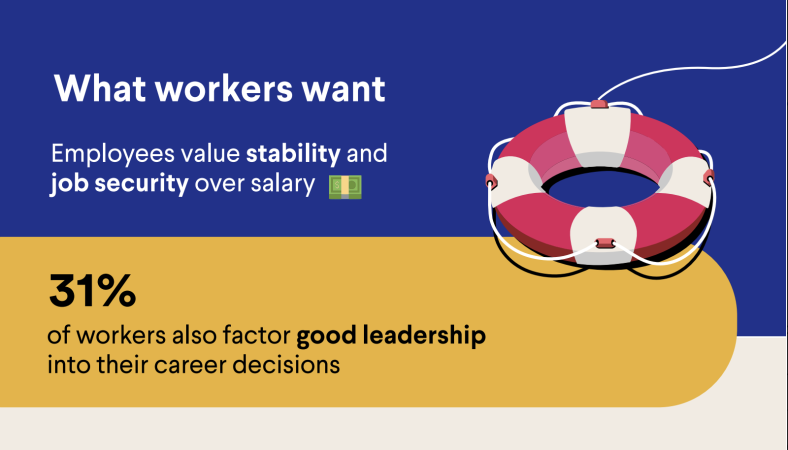
The report that surveyed 1,000 Singaporean employees at companies with more than 100 employees found that the impact of the pandemic, the uncertain economic environment, and the burnout experienced by over half of Singaporean knowledge workers in the last year, have irrevocably changed what employees want from their leaders.
Over half of those in the survey reported burn out, nearly one in two Singaporean knowledge workers are considering moving jobs in the next year, while 16% admit to ‘quiet quitting’.
“The reality is that many Singaporean professionals are burnt out," says Shweta Verma, Country Manager, Singapore, for Slack. "Leaders have an obligation to address this – not least for the wellbeing of their employees, but also to drive the productivity of their organisations."
Leaders will need to ensure their own leadership style isn’t having a negative impact on the engagement and motivation of their employees. This means:
- focusing more on soft or ‘power’ skills - human-centred, interpersonal skills related to areas such as collaboration, social and emotional intelligence;
- analysing the time employees are spending on unproductive tasks;
- exploring ways to elevate productivity with collaborative technology; and
- figuring out how to meet the varying expectations of employees from different generations, who prefer to work in different ways.
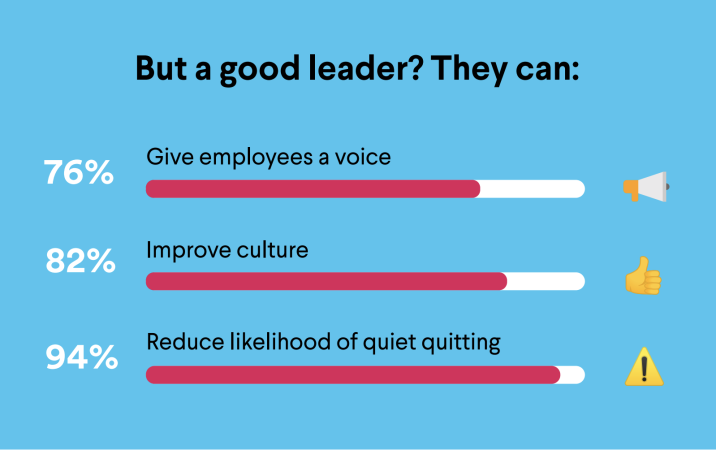
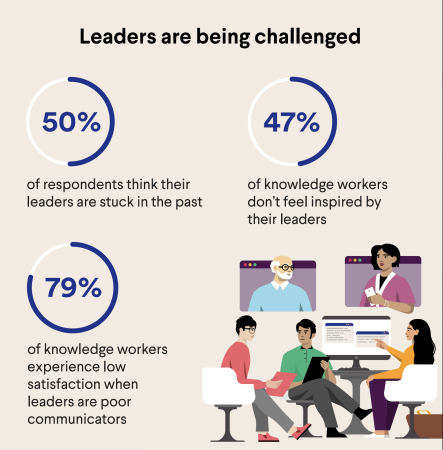
"As we continue to go through one of the biggest workplace experiments of the century - moving from physical offices to digital headquarters - it’s critical that employers demonstrate sound, positive leadership,” adds Verma.
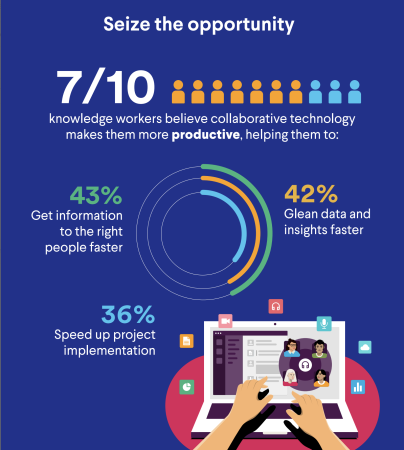
Here are six takeaways from the report
Poor leadership leads to burnout, quiet quitting
The research showed a clear link between poor leadership and a dip in employee morale and productivity.
- Only half of Singaporean professionals say they feel inspired by their leaders, and the same number find their leaders “stuck in their ways of working.”
- Over half (51%) of those who ‘quiet quit’ reported having poor leaders.
- Employees with poor or average leaders feel they have much less of a voice, and less control and autonomy over their work. Additionally, they reported more of a disconnect between leaders and employees, and reported culture feeling more forced.
Collaborative technology as potential ‘power tools’ for boosting leadership

There is a correlation between those respondents that hold their leaders in high regard and those whose leaders embrace the use of collaborative technology.
- Nearly two-thirds of Singaporean knowledge workers saw collaboration tools as enabling them to be productive, among other benefits. These include being able to free up time by automating work, getting information to the right people quickly, speeding up the implementation of projects, improving communication with leadership, prioritising tasks, and achieving faster feedback loops.
The real reason Singaporean knowledge workers don’t have enough hours in the day
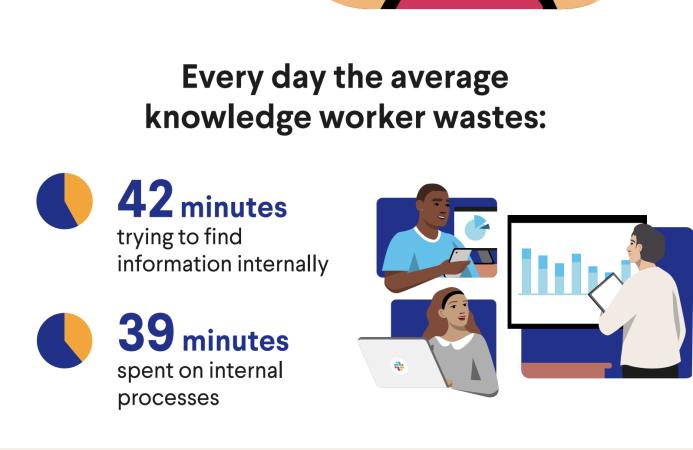
Singaporean knowledge workers say they spend non-productive time on routine and often mundane tasks.
- Nearly a third of respondents feel that it takes them too long to find information internally, and that internal processes take up too much of their day.
- A similar number find that communicating across the company, within big teams and across time zones is slow due to delayed responses.
- Where this is the case, around a quarter of this group say they are spending over an hour a day on these activities.
Mind the generation gap
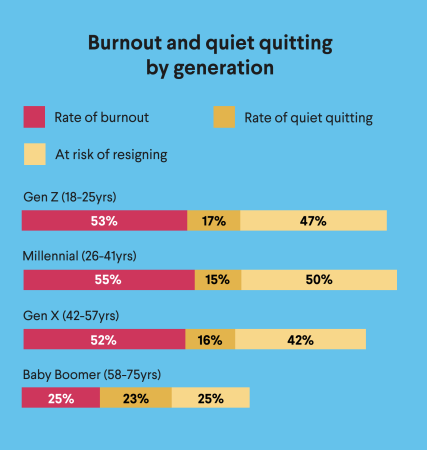
The survey shows significant generational differences in employees in Singapore in terms of what they expect from their leaders, making it clear that people management is not a one-size-fits-all.
- Gen Z are the most concerned with wellbeing, having a highly social culture and desiring empathetic leaders. While they are more likely to be inspired by leadership, they are also the most likely to switch jobs.
- Millennials also want a focus on wellbeing, transparent and trustworthy leadership, and a great employee experience. They are the most likely to feel a disconnect between leaders and employees, and have the highest levels of job dissatisfaction.
- Gen X places the greatest importance on flexibility, transparent, and trustworthy leadership, and are the least concerned with wellbeing. They want their employers to have a consistent purpose, supported by robust processes. They are the least interested in technology and innovation.
- Baby Boomers are middle-of-the-road on most things, but are particularly favourable towards having robust processes, clear KPIs, and accountability frameworks, as well as a clear level of autonomy in work.
Burnout by sector
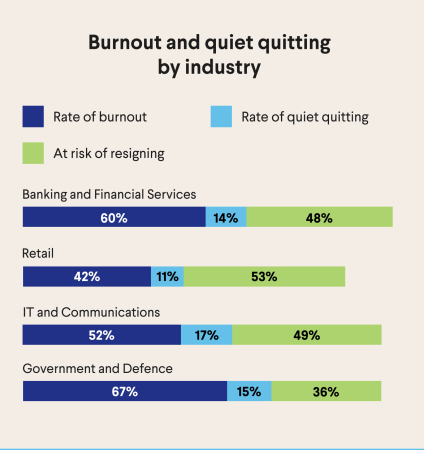
The research showed some clear differentiation between what Singaporean knowledge workers across different industries are feeling and looking for.
- IT & tech: Respondents from the tech sector gave the highest scores to their managers for being competent and communicating well. Although not inspirational, IT leaders are seen to lead by example.
- Financial services: Respondents from the banking sector were the most likely to want more meaning in their job. They also reported some of the highest rates of burnout, dissatisfaction, and quiet quitting.
- Retail: Singapore’s retail knowledge workers seem to be more positive than their peers in other industries right now. Half (51%) say they feel strongly about doing the right thing by their employer and are happy to go “above and beyond”. At 42%, retail also has the lowest proportion of workers who say they’ve felt burned out during the past 12 months.
- Government: More than half (56%) of government employees say that email is still their primary method of communication with customers and partners - a proportion significantly higher than other industries in the survey. Government workers are also more likely to be working from a mix of home and office environments, with around two-thirds (67%) saying they are working this way.
A new perspective on the office
Employees still value working in the office despite an increasing number of people working from home. According to the study;
- When asked what they felt the office was best suited for, Singaporean knowledge workers cited team building, social connection, collaboration and brainstorming, and one-on-one/development meetings.
- Activities like progress updates, company town halls, learning programmes, and knowledge sharing sessions were perceived as less critical to be held in an office.
All photos / Slack
share on
Follow us on Telegram and on Instagram @humanresourcesonline for all the latest HR and manpower news from around the region!
Related topics


